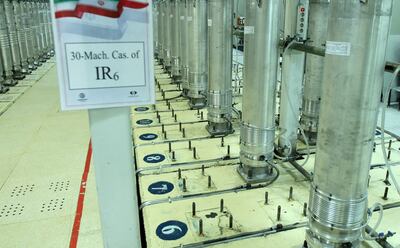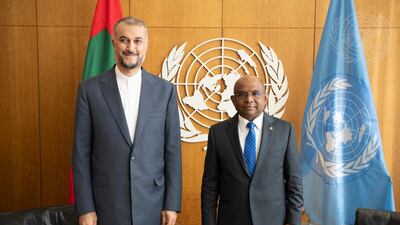Follow for live UN General Assembly coverage
A sense of pessimism on the fate of the 2015 Iran nuclear deal prevailed in New York on Friday, despite a week of meetings among US, European and Iranian diplomats and a vague promise from Iran's top diplomat that Tehran wants talks to resume "very soon".
The new Iranian foreign minister, Hossein Amir-Abdollahian, made it clear that Tehran is looking for action from the administration of President Joe Biden on the Joint Comprehensive Plan of Action (JCPOA).
“We are an action-orientated government. For us, words are important, but more important is action,” Mr Amir-Abdollahian told a group of reporters on Friday.
“We have not seen one iota of a positive action [from the US],” he added.
Without giving a date, Mr Amir-Abdollahian stressed that Iran’s desire is to return “very soon” to the table with the countries party to the deal, but that it needs to “see negotiations that can lead to positive, tangible action".
"We are reviewing the Vienna negotiations files currently and very soon Iran's negotiations with the four plus one countries will recommence," Hossein Amir-Abdollahian said, referring to Britain, France, Russia, China and Germany.
He did not specify which actions Tehran is seeking, but mentioned US restrictions prohibiting Iran from accessing medical funds and more than 1,600 other sanctions that the Biden team has kept from the Trump era.
Mr Amir-Abdollahian was more optimistic about the prospects of regional dialogue with neighbouring countries such as Saudi Arabia and mentioned the Yemen war as one area that the two sides have been discussing.
Except for Israel, which Mr Amir-Abdollahian called a “fake regime”, Iran is looking to engage in neighbourly relations with other countries in the region.
Iran's stated desire to return to the negotiating table comes as US negotiators voice growing urgency on the need to resume talks to cap the country’s uranium enrichment.
US Secretary of State Antony Blinken this week warned that time is running out.
“Every passing day, as Iran continues to take actions that are not in compliance with the agreement, particularly building larger stockpiles of highly enriched uranium to 20 per cent, even 60 per cent and spinning faster centrifuges, we will get to a point … at which simply returning to the JCPOA will not recapture the benefits of the agreement,” Mr Blinken said on Thursday.
A senior US official told The National that ultimately, Iran would return to the table but he expressed concerns about its new hard-line government under conservative President Ebrahim Raisi.
Mr Raisi this week unleashed an anti-US diatribe at the UN General Assembly, blasting America for its "hegemony".
“We are worried that this team has different intentions. All of the P5+1 countries agree that we should come back soon [to the talks] and that we should start from where we left off in the sixth round, but we have no indication yet about when [the Iranians] are coming back, who is going to lead their team and whether they are prepared to continue where we dropped off,” the US official said.
Asked about US options if the talks remain stalled, the official said Washington must examine those.
“Every government has to look at options and make plans. We will have ways to deal with a situation where Iran refuses to return to the talks, delays its return for too long or comes back with positions incompatible with a mutual return to compliance with the deal," the official said.
"It's not our preference, but we will be ready."
Speaking on the sidelines of the UNGA, the official added that in their meeting, the US and GCC members were in agreement that a return to the nuclear deal would be a welcome step, but that additional diplomacy would be required to tackle other Iranian issues.
“The GCC members all seemed on the same page as we are that even if you reach an agreement [with Iran], you need to deal with [its] other activities,” he said, adding that the US was already co-ordinating with parties in the region in this regard.
In its latest assessment, the Eurasia policy group said this week that the revival of the Iran nuclear agreement is unlikely to occur this year given mounting uncertainty about Tehran’s interest and the shrinking timetable.
The group put the chances of a continued stalemate in 2021 at 70 per cent, up from 45 per cent last month.










































